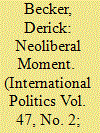| Srl | Item |
| 1 |
ID:
098473


|
|
|
|
|
| Publication |
2010.
|
| Summary/Abstract |
This article is motivated by two trends in international relations (IR): the general trend toward global neoliberalism, and the discursive turn in IR scholarship. Neoliberalism, while not fully practised anywhere, has become the dominant discourse and normative measure of economic policy ideas around which policy debates coalesce. This all is the more noticeable among the lesser-developed countries. This article attempts to explain this gradual shift in the global political economy where most discussions centre around a core set of ideas and beliefs about how the system ought to function. Given that evidence of this ideational/discursive shift predates the end of the Cold War and changed out of step with the steady growth in economic interdependence, new approaches are warranted. What is argued here is that the study of social interaction among states will shed considerable light onto how the international system has developed into its current state.
|
|
|
|
|
|
|
|
|
|
|
|
|
|
|
|
| 2 |
ID:
103902


|
|
|
|
|
| Publication |
2010.
|
| Summary/Abstract |
In the years since the end of apartheid, South Africa has emerged from its status as an international pariah to a full fledged member of the international community. Riding a wave of new found legitimacy bolstered by a heroic myth surrounding President Mandela, South Africa began to rethink its role in the world. Perhaps more than Mandela, however, former President Thabo Mbeki laid claim to the title of Africa's spokesman to the world. Mbeki, through his African Renaissance, cast himself as the embodiment of the modern, postcolonial African blending African tradition and symbolism with the rhetoric of free markets and good governance. What this paper argues is that Mbeki's Renaissance highlights both what constitutes legitimate policies and behavior and the role of legitimacy and legitimation itself in international relations.
|
|
|
|
|
|
|
|
|
|
|
|
|
|
|
|
| 3 |
ID:
095598


|
|
|
|
|
| Publication |
2010.
|
| Summary/Abstract |
In the years since the end of apartheid, South Africa has emerged from its status as an international pariah to a full fledged member of the international community. Riding a wave of new found legitimacy bolstered by a heroic myth surrounding President Mandela, South Africa began to rethink its role in the world. Perhaps more than Mandela, however, former President Thabo Mbeki laid claim to the title of Africa's spokesman to the world. Mbeki, through his African Renaissance, cast himself as the embodiment of the modern, postcolonial African blending African tradition and symbolism with the rhetoric of free markets and good governance. What this paper argues is that Mbeki's Renaissance highlights both what constitutes legitimate policies and behavior and the role of legitimacy and legitimation itself in international relations.
|
|
|
|
|
|
|
|
|
|
|
|
|
|
|
|